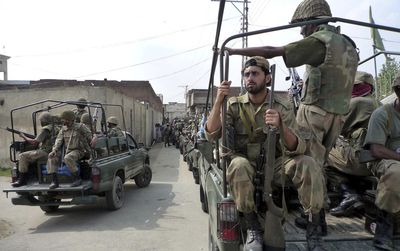Pakistan to deport Afghans from restive tribal regions

KHAR, Pakistan – Pakistan ordered the deportation of about 50,000 Afghan refugees in an insurgency-wracked tribal region amid a major military offensive against al-Qaida and Taliban fighters.
The government said it was expelling Afghan refugees in the Bajur tribal region, alleging many of them have links to militant groups. Police in the town of Khar in Bajur arrested 25 Afghans and said they soon would be deported.
“The orders have been issued to the tribal police to push all of them (refugees) out,” said local government official Abdul Haseeb, adding that their homes would be bulldozed to keep them from returning.
A government offensive in Bajur that began in early August has killed about 1,000 people. It comes amid increased U.S. pressure on the government of President Asif Ali Zardari to crack down on militants in the restive border region where al-Qaida leader Osama bin Laden is believed to be hiding.
Washington has long complained Pakistan is unwilling or unable to take strong action against the extremists.
Zardari has pledged cooperation in the fight against terrorism, but must tread carefully given strong opposition to his country’s alliance with Washington.
This balancing act has become increasingly complicated by an upswing in U.S. missile strikes against suspected al-Qaida and Taliban hide-outs in the northwest and more recently by Zadari’s comments to the Wall Street Journal suggesting he had consented to the strikes.
“We have an understanding, in the sense that we’re going after an enemy together,” the newspaper quoted him as saying after paraphrasing Zardari’s apparent consent for the missile strikes. The interview appeared Saturday.
On Monday, government spokesman Farhatullah Babar insisted there was no deal allowing the U.S. to fire missiles at militant hide-outs in Pakistan, saying the journalist had read too much into Zardari’s comment and that the president was talking in generalities about fighting terrorism.
“The official position is that we do not allow foreign incursions into Pakistani territory,” Babar said.
Zardari also told the Journal “India has never been a threat” to Pakistan and called Islamist militant groups in the disputed Kashmir region “terrorists.” Those comments stirred concern within Pakistan’s powerful army that has traditionally viewed India as its No. 1 enemy.
In the latest in a string of bombings against government military and Western targets in Pakistan, a suicide bomber attacked a lawmaker’s home in the east of the country, killing 15 people and wounding 50, officials said.
The blast occurred at the home of Rasheed Akbar Niwani, a member of the Pakistan Muslim League, the main opposition party in the federal government.
Police officer Khan Baig said it was not immediately clear whether Niwani was among the victims or why he was targeted.